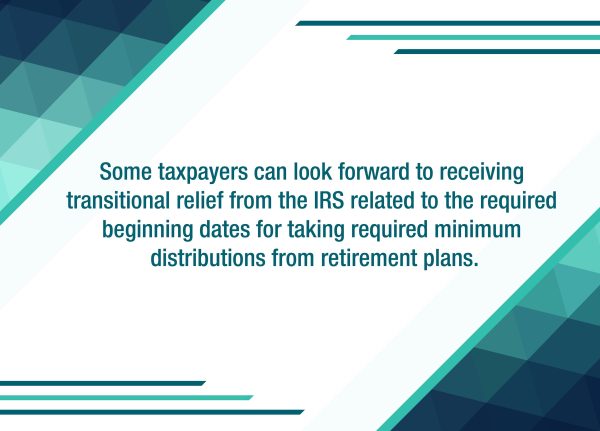It can be difficult for business owners to navigate the tax code and monitor tax law developments. One area of special concern is financial reporting for uncertain tax positions (UTPs). Here’s some insight to help clarify matters. Recognition standard Companies that follow U.S. Generally Accepted Accounting Principles (GAAP) must identify, measure and disclose UTPs using […]
The IRS has issued new guidance providing transitional relief related to recent legislative changes to the age at which taxpayers must begin taking required minimum distributions (RMDs) from retirement accounts. The guidance in IRS Notice 2023-54 also extends relief already granted to taxpayers covered by the so-called “10-year rule” for inherited IRAs and other defined contribution plans. […]
Do-it-yourself business valuations and the use of unqualified financial experts can increase the odds of making an error, misstatement or erroneous deviation from customary valuation practice. These faux pas could trigger (or worsen) an IRS inquiry or perhaps lead to an embarrassing courtroom mishap. Here are three common valuation pitfalls that qualified valuation professionals are […]
When a loved one passes away, you might think that the options for his or her estate plan have also been laid to rest. But that isn’t necessarily the case. Indeed, there may be postmortem tactics the deceased’s executor (or personal representative), spouse or beneficiaries can employ to help keep his or her estate plan […]
Does your organization offer health care and retirement benefits for its employees? Benefit plans with 100 or more participants are generally required to have their annual reports audited under the Employee Retirement Income Security Act of 1974 (ERISA). Here’s some guidance to help plan administrators fulfill their fiduciary responsibilities for hiring independent qualified public accountants […]
If you’re planning your estate, or you’ve recently inherited assets, you may be unsure of the “cost” (or “basis”) for tax purposes. How do the rules work? Under the current fair market value basis rules (also known as the “step-up and step-down” rules), an heir receives a basis in inherited property equal to its date-of-death […]
If you’re age 50 or older, you can probably make extra “catch-up” contributions to your tax-favored retirement account(s). It is worth the trouble? Yes! Here are the rules of the road. The deal with IRAs Eligible taxpayers can make extra catch-up contributions of up to $1,000 annually to a traditional or Roth IRA. If you’ll […]
by Jun Wang, CPA, MST If you regularly travel to client sites, gather office supplies, attend conferences, or own multiple pass-through entities, you may be entitled to tax deductions or reimbursement from your employer. Any other business-related travel may be deducted by way of a mileage log—an efficient way to accurately track, measure, and record […]
For employers of all sizes, choosing an affordable yet fully featured health plan to sponsor for employees isn’t easy. And yet, for most organizations, it’s an imperative. Under the Affordable Care Act, employers with 50 or more full-time or full-time-equivalent employees must offer a health plan that meets certain standards or face a financial penalty. […]
High-income taxpayers face a regular income tax rate of 35% or 37%. And they may also have to pay a 3.8% net investment income tax (NIIT) that’s imposed in addition to regular income tax. Fortunately, there are some ways you may be able to reduce its impact. Affected taxpayers The NIIT applies to you only […]
Accrual-basis financial statements are considered by many to be the gold standard in financial reporting. But with the increasing cost and complexity of today’s accounting rules — in particular, the updated lease guidance that went into effect last year — some private companies are seeking a simpler alternative to U.S. Generally Accepted Accounting Principles (GAAP). […]
For 2023, the federal gift and estate tax exemption amount stands at $12.92 million ($25.84 million for married couples). But without action from Congress, on January 1, 2026, it’s scheduled to drop to only $5 million ($10 million for married couples). Based on current estimates, those figures are expected to be adjusted for inflation to a little over $6 million […]












